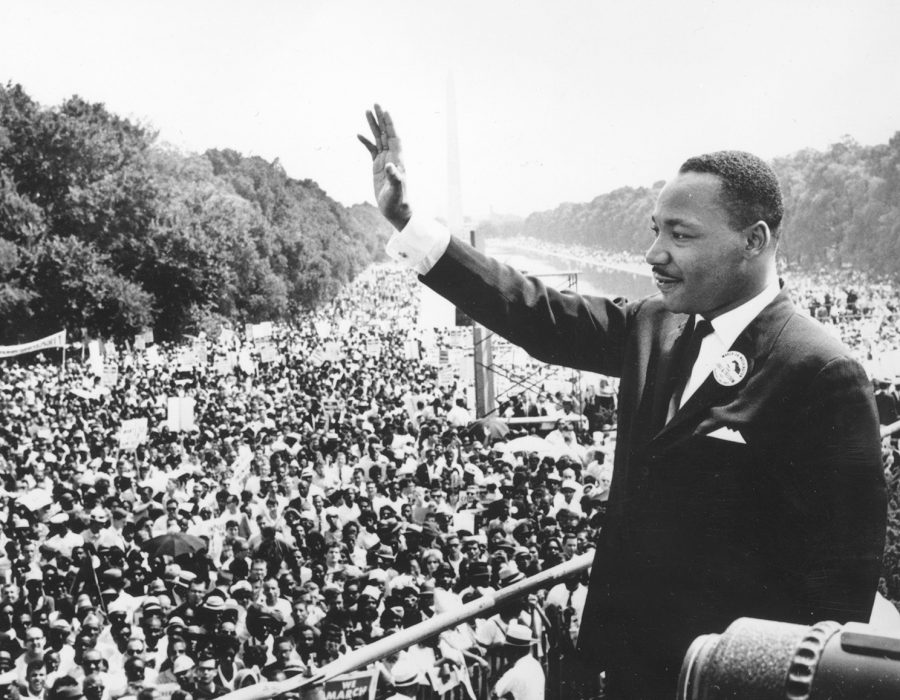True way to honor MLK’s legacy
Opinion columnist Caleb Stekl discusses tolerance, political correctness and Martin Luther King Jr.
Jan 24, 2019
We are, today, approaching a (false) political horizon that defines freedom in terms of tolerance: so long as we all have the same civil and political rights, we can all coexist happily together in one organic unity. Standing in opposition to this view, radical Black politics presents a disruptive alternative.
Martin Luther King, Jr. was perhaps the most subversive political actor in 20th century American politics. We have seen since the revolutionary potential of the 1960’s massive changes in the legal and social structure of the United States: Blacks are (formally) equal, (official) discrimination is illegal, we can all sit at the same booth in the diner. Only within this historical trajectory could, in the wake of Barack Obama’s election, Lou Dobbs claim we live in a “post-racial” society. In this age of tolerance, all ends of the political spectrum can (more or less) peacefully coexist. However, we should not be so cynical and the election of Donald Trump is the catalyst that forces this traumatic realization: neo-Nazis marching the in streets, #MAGA neo-fascists taunting indigenous tribesmen and so on.
An uncomfortable question presents itself: how has the increase in personal freedoms not led to a corollary increase in social harmony and equality? Political correctness is the linguistic extension of this logic of formal freedoms: so long as we are not verbally racist or sexist, I can coexist with the Other. However, two contradictions emerge. This “tolerated” Other is not an authentic Other. It is the aestheticized Other we want to see: refugees as simple, hard-working people just searching for a better life; Blacks as a people of jazz and comedy. Further, tolerance already presupposes a level of discomfort with this Other: if we really did accept them in their naked, vulgar reality, tolerance would be unnecessary. Thus, today’s politically correct liberal establishment cannot grapple with the obscenities which are to be expected when ethnic groups are structurally oppressed: violent outbursts from African refugees in continental Europe, statistically higher rates of violence among generationally impoverished Blacks, and so on. Here, political correctness enters the equation, not as a way of respecting other cultures, but precisely to perpetuate this inequality. How?
Karl Marx’s (in)famous statement on religion should be reversed with political correctness taking the place of religion: the opiate of oppression (for the ruling class) is political correctness. What do I mean? Political correctness places, at a certain distance, various antagonisms: race, poverty, sexuality, gender, etc. It occupies the precise space which allows us to “peacefully” coexist: so long as I don’t make a racist or sexist remark, I can be a legitimate political actor. This is the logic with which the contemporary Republican Party (and to an extent the Democratic Party) operates. The GOP is officially non-racist: there are Black, Muslim, women and gay party members. It would appear that the GOP is, at least formally, somewhat progressive. Of course, the obvious flipside is their brutal policy platform: economic austerity, foreign interventions, harsh criminal sentencing, etc. Political correctness operates at the level of the opiate: so long as we are formally non-racist, non-sexist, etc., we can espouse whatever policy preferences we prefer.
Let us return, finally, to MLK. It may surprise many of you that MLK never once used the word tolerance in any of his speeches. He would, likely, have strongly disavowed many of those who benefit from the civil and political freedoms he fought so hard to win: Kamala Harris’ brutal prosecutorial record and Corey Booker’s corporatist politics. The radical aspect of MLK’s politics is the side which (expectedly) is negated by liberals and conservatives alike: we approach MLK only in his socially progressive dimension; formal rights, ending discrimination, police brutality, and so on. However, MLK’s real subversives can only be appreciated when we reify his economic politics. Only on the fringes of the left do we see any mention of his self-espoused Democratic-Socialism or his Poor People’s Campaign. This reification is necessitated by the fact that, since the 1960’s, Black economic equality has, by many measures, actually decreased. The proper way to honor MLK is to actualize the full power of his famous, “I Have a Dream” speech. This dream cannot be limited to legal and social tolerance, but to dream of a world in which real, radical equality realizes its full meaning even in the face of social intolerance. A society in which a Black person can be not only be free from the need to constantly protest and organize, but one in which structural oppression is eliminated altogether.
To conclude, a common polemic against young activists by political leaders is, “stop dreaming, vote, run for office!” However, the need for radical dreaming is now more prevalent than ever. Not the dream of a more tolerant society, but one in which tolerance itself is not determinative of freedom as such.

















